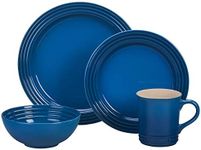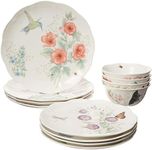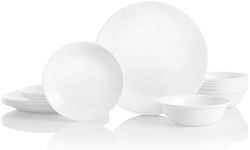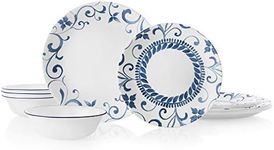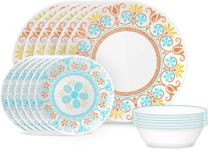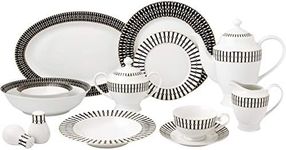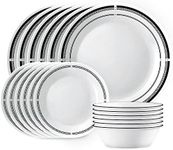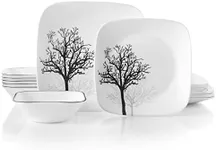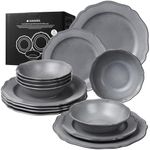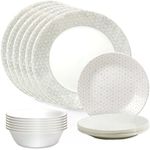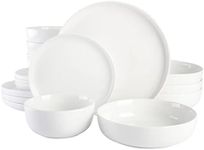Buying Guide for the Best Non Toxic Dinnerware
Choosing non-toxic dinnerware is a smart move for anyone who wants to ensure their meals are served on safe, healthy surfaces. Non-toxic dinnerware is made without harmful chemicals or heavy metals that could leach into your food, especially when exposed to heat or acidic ingredients. When shopping for non-toxic dinnerware, it's important to look beyond just the style and color—focus on the materials, coatings, and certifications that guarantee safety. Understanding the key specifications will help you make a choice that fits your lifestyle and gives you peace of mind at every meal.MaterialThe material of your dinnerware is the most important factor in determining whether it is non-toxic. Common safe materials include porcelain, stoneware, glass, stainless steel, and certain types of bamboo or wood. Each material has its own benefits: porcelain and glass are non-porous and easy to clean, stainless steel is durable and unbreakable, while bamboo and wood are lightweight and eco-friendly. Avoid dinnerware made from plastics or ceramics with unknown glazes, as these can sometimes contain harmful chemicals. To pick the right material, think about how you use your dinnerware—if you want something for everyday use, durability and ease of cleaning might be your top priorities, while for special occasions, you might prefer something more elegant.
Glaze and CoatingMany ceramic and porcelain dishes are coated with a glaze to make them shiny and waterproof. However, some glazes can contain lead or cadmium, which are toxic if they leach into food. Look for dinnerware labeled as 'lead-free' and 'cadmium-free.' If you use your dishes in the microwave or dishwasher, make sure the glaze is also certified as safe for these uses. For those who want to be extra cautious, unglazed glass or stainless steel are good options, as they don’t require any coating. Your choice should depend on how much you value aesthetics versus safety—if you love colorful, patterned dishes, just make sure the glazes are certified non-toxic.
CertificationsCertifications are a helpful way to know if dinnerware meets safety standards. Look for products that are certified by recognized organizations, such as the FDA (Food and Drug Administration) or those that meet California Proposition 65 standards. These certifications mean the dinnerware has been tested for harmful substances. If you want extra assurance, check for third-party testing or certifications from reputable safety organizations. If you have children or sensitive individuals in your household, prioritizing certified products can give you added peace of mind.
Microwave and Dishwasher SafetyNot all non-toxic dinnerware is safe to use in the microwave or dishwasher. Some materials can crack, warp, or leach chemicals when exposed to high heat. Always check if the dinnerware is labeled as microwave-safe and dishwasher-safe. If you often reheat food or prefer easy cleaning, this is an important feature. For those who hand-wash dishes or don’t use a microwave, this may be less critical, but it’s still good to know the limits of your dinnerware.
DurabilityDurability refers to how well the dinnerware stands up to daily use, drops, and temperature changes. Glass and porcelain can chip or break if dropped, while stainless steel and some high-quality plastics are more resistant. If you have young children or want dinnerware for outdoor use, durability should be a top consideration. For formal dining, you might accept more delicate pieces, but for everyday meals, something sturdy will last longer and stay looking good.
